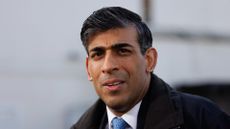Why would there be so many paedophiles in Westminster?
Craving the love and devotion of their victims, it is not surprising that some culprits are politicians

Home Secretary Theresa May, still trying to find someone suitable to chair her inquiry into historical claims of sex abuse against children, told the BBC’s Andrew Marr yesterday that the allegations that have emerged so far are only “the tip of the iceberg”.
Institutions which were meant to protect children “were not doing so”, she told Marr, and society must “get the truth” about the extent of child abuse and what might have been covered up.
Her comments came as the Sunday People revealed that two retired Scotland Yard detectives have come forward to corroborate the evidence of a paedophile victim known as ‘Nick’ who told the paper he saw a Conservative MP murder a young boy during a “sex party” more than 30 years ago.
Subscribe to The Week
Escape your echo chamber. Get the facts behind the news, plus analysis from multiple perspectives.

Sign up for The Week's Free Newsletters
From our morning news briefing to a weekly Good News Newsletter, get the best of The Week delivered directly to your inbox.
From our morning news briefing to a weekly Good News Newsletter, get the best of The Week delivered directly to your inbox.
The People reports that Scotland Yard are investigating three murders linked to an establishment paedophile ring. The two retired detectives say the ring was dubbed The Untouchables because those involved were “too powerful to bring to justice”.
It is now four months since police discovered that the late MP Geoffrey Dickens’s 1983 dossier detailing alleged child abusers within the Westminster establishment had disappeared, leading to questions of a cover-up.
Amongst the list of alleged abusers was Rochdale MP Cyril Smith, described by his successor, Simon Danczuk, as the “29 stone bully” who sexually abused boys. Although Cyril Smith and other politicians listed in the Dickens dossier have since died, up to 20 current and former politicians remain under investigation.
The allegations of abuse and murder raise direct questions about what is going on in Britain’s corridors of power.
Why are some politicians – trusted to look after the best interests of their constituencies – compelled to engage in this form of abusive behaviour, jeopardising their own careers? Is it simply that power has gone to their heads or is it indicative of deeper, more complex problems in the individuals attracted to political careers?
We are all susceptible to feeling sexual attraction towards children but this doesn’t mean that we act on our feelings.
Children often behave seductively towards adults for different reasons. They may want to feel that they have a special power over an adult, usually in order to feel loved, or they may be looking for acceptance of their developing sexuality just as a daughter might want her father’s admiration of her as a young woman. Or a child who has had a sexualized relationship with a parent may repeat this with another adult, confusing sex with love.
But who are the adults who do act on these feelings - and what is it that compels them to do so?
For the men who constitute the majority of listed paedophiles, sexual contact with children offers a number of attractions. Children, particularly those who have been neglected or who are hungry for love, are easy and rewarding targets.
These children imbue their adult seducer with enormous power, to the point of becoming their - seemingly - willing slaves. The seducer is similarly hungry for love and the total admiration that may have been lacking in his own childhood.
Unconsciously, the seducer is also using the child to repeat a drama that he experienced as a child. The paedophile typically has a history of childhood neglect and abuse that he is trying to manage. One way of doing this is to adopt the role of a “benign” parent who appears to love a child, to make the child feel special and powerful, and to offer an intimacy that no one else can offer.
In this role, the paedophile tries to turn the tables on his own abusive history by becoming the parent instead of the child and the seducer rather than the one who is seduced and deceived.
In cases of violent or forced sexual contact, the paedophile is also invariably enacting his own abusive childhood but in a position of mastery.
Because the paedophile needs to deny the extent to which he has been hurt by neglectful or narcissistic parents as well as his own hateful feelings towards them, he is unlikely to understand what harm he is inflicting on children.
In the case of a compliant victim, the special erotic bond becomes a heady mixture that cuts across the difference between generations and makes both partners feel omnipotent and above the law.
What is not acknowledged, certainly by the paedophile, is that he is using a child for his own narcissistic gratification under the guise of care. The paedophile unconsciously re-enacts with his victim the contempt to which he was subjected as a child.
In his fantasy, the paedophile plays the role of being a “special mother” to a child who is then made to feel specially loved. In offering this “special” relationship, he can be better than an ordinary mother. The paedophile can then deny his own lack of a good mother and sustain an illusion that he has no need for care himself.
The paedophile’s unconscious hatred of his mother, whom he has tried to supplant, and of his victims whom he has harmed, leads to feelings of guilt. The anxiety produced by guilt can only be relieved through punishment.
This dynamic causes the paedophile to enter an exciting game of risk-taking. He flirts with danger, always on the brink of being found out – and punished. This is often why paedophiles, inadvertently, give themselves away, leaving evidence of their crimes in order to be caught out.
In his need for constant reassurance that he is desirable and admired, the paedophile abuses his position of power over children to gratify his narcissism. But the gratification is inevitably short-lived and the need for further reassurance, especially given the paedophile’s guilt, can cause a rapid escalation in seeking more victims and in the nature of the abuse itself – to the point of murder.
It is not surprising that paedophiles, craving the love and devotion of their victims, are found among our politicians, many of whom - like showbusiness stars or authority figures in other professions - are attracted to the limelight for similar reasons. Beware the charisma of our leaders.
Create an account with the same email registered to your subscription to unlock access.
Sign up for Today's Best Articles in your inbox
A free daily email with the biggest news stories of the day – and the best features from TheWeek.com
-
 'Horror stories of women having to carry nonviable fetuses'
'Horror stories of women having to carry nonviable fetuses'Instant Opinion Opinion, comment and editorials of the day
By Harold Maass, The Week US Published
-
 Haiti interim council, prime minister sworn in
Haiti interim council, prime minister sworn inSpeed Read Prime Minister Ariel Henry resigns amid surging gang violence
By Peter Weber, The Week US Published
-
 Today's political cartoons - April 26, 2024
Today's political cartoons - April 26, 2024Cartoons Friday's cartoons - teleprompter troubles, presidential immunity, and more
By The Week US Published
-
 Will Aukus pact survive a second Trump presidency?
Will Aukus pact survive a second Trump presidency?Today's Big Question US, UK and Australia seek to expand 'game-changer' defence partnership ahead of Republican's possible return to White House
By Sorcha Bradley, The Week UK Published
-
 Farewell to Theresa May: a PM consumed by Brexit
Farewell to Theresa May: a PM consumed by BrexitTalking Point Maidenhead MP standing down at next general election
By The Week UK Published
-
 It's the economy, Sunak: has 'Rishession' halted Tory fightback?
It's the economy, Sunak: has 'Rishession' halted Tory fightback?Today's Big Question PM's pledge to deliver economic growth is 'in tatters' as stagnation and falling living standards threaten Tory election wipeout
By Harriet Marsden, The Week UK Published
-
 Why your local council may be going bust
Why your local council may be going bustThe Explainer Across England, local councils are suffering from grave financial problems
By The Week UK Published
-
 Rishi Sunak and the right-wing press: heading for divorce?
Rishi Sunak and the right-wing press: heading for divorce?Talking Point The Telegraph launches 'assault' on PM just as many Tory MPs are contemplating losing their seats
By Keumars Afifi-Sabet, The Week UK Published
-
 How would a second Trump presidency affect Britain?
How would a second Trump presidency affect Britain?Today's Big Question Re-election of Republican frontrunner could threaten UK security, warns former head of secret service
By Harriet Marsden, The Week UK Published
-
 'Rwanda plan is less a deterrent and more a bluff'
'Rwanda plan is less a deterrent and more a bluff'Instant Opinion Opinion, comment and editorials of the day
By The Week UK Published
-
 How the biggest election year in history might play out
How the biggest election year in history might play outThe Explainer Votes in world's biggest democracies, as well as its most 'despotic' and 'stressed' countries, face threats of violence and suppression
By Harriet Marsden, The Week UK Published